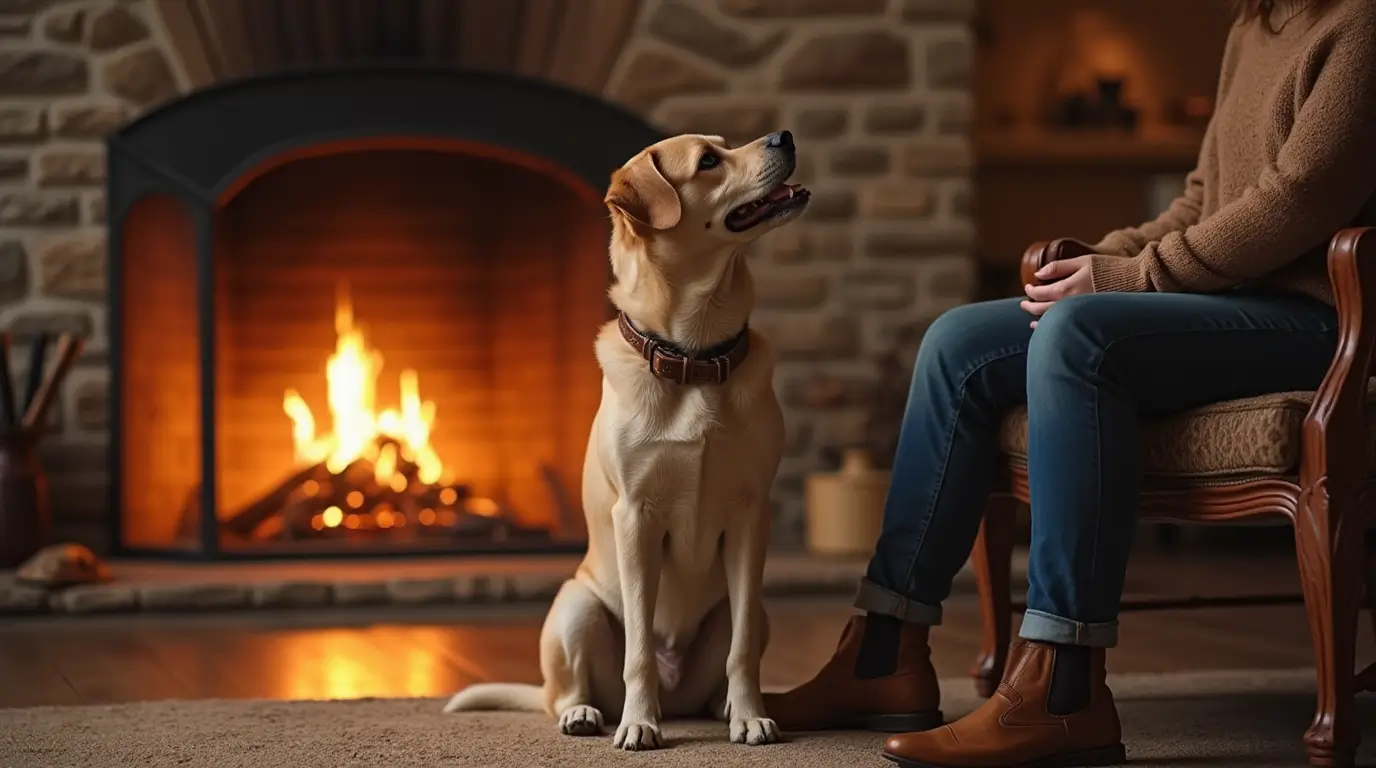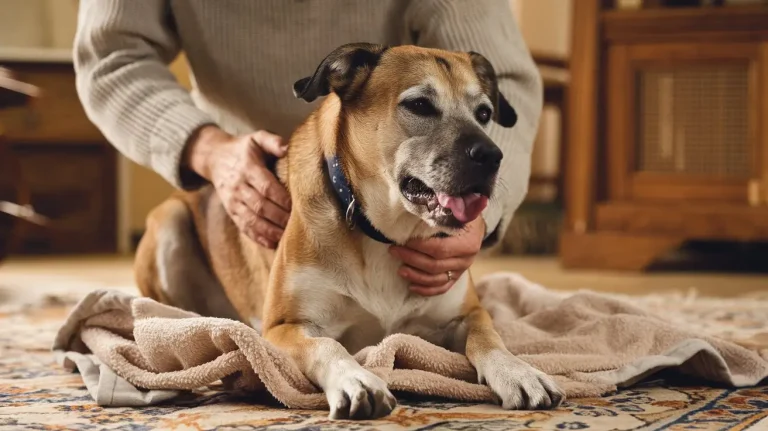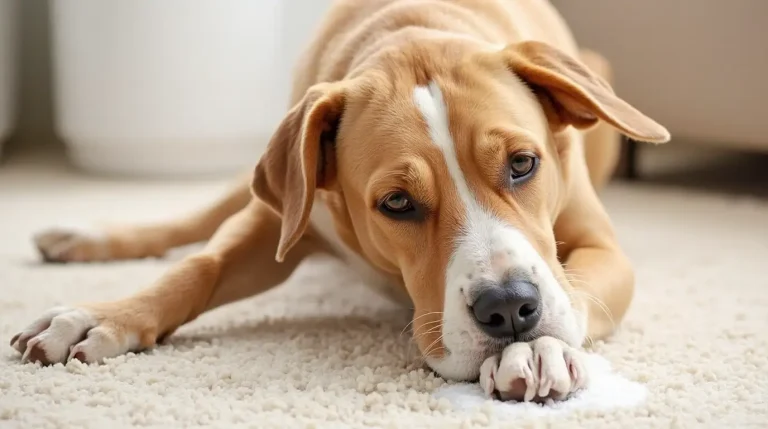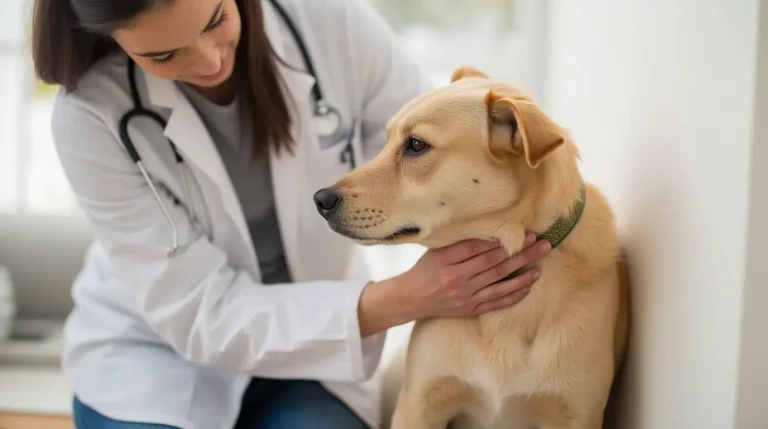If you’ve ever wondered, “Why does my dog lick my feet?” you’re not alone. Many dog owners experience this quirky yet common behavior. While it may seem strange, licking is a natural instinct for dogs and serves various purposes, from showing affection to exploring their environment.
Dogs use their tongues as a way to communicate, bond with their owners, and even gather sensory information. Your feet, in particular, can be intriguing to your furry friend because of their scent, taste, and warmth. However, excessive licking could also indicate underlying issues such as anxiety, attention-seeking behavior, or even a medical concern.
In this article, we’ll explore the common reasons why dogs lick feet, whether it’s safe for them to do so, and how to manage or stop the behavior if it becomes excessive. Keep reading to uncover the fascinating reasons behind your pup’s licking habit!
Table of Contents
Common Reasons Why Dogs Lick Feet
Dogs use licking as a way to explore their environment, communicate with their owners, and express emotions. While it may seem unusual, licking feet is a natural behavior driven by instinct, habit, and curiosity. Below are the most common reasons why your dog might be licking your feet.
1. Affection and Bonding
Dogs often lick their owners as a way to show love and strengthen their bond. In the same way that dogs groom each other as a sign of social bonding, they may lick their human companions to express affection.
Licking releases endorphins in dogs, which helps them feel comforted and secure. When your dog licks your feet, it may be their way of saying, “I love you, and I feel safe with you.” Some dogs use licking to reinforce their pack mentality, treating you as part of their social group.
If your dog wags its tail, looks relaxed, and seems happy while licking your feet, it’s likely an affectionate gesture. However, if the licking becomes excessive or compulsive, it could be a sign of anxiety or a need for reassurance.
2. Taste and Scent Attraction
Dogs have an incredibly strong sense of smell—up to 100,000 times more powerful than humans. Your feet contain unique scents from sweat, body oils, and bacteria, making them an interesting and appealing target for your dog’s keen nose.
Additionally, sweat contains natural salts that some dogs find tasty. If your feet are sweaty after a workout or a long day, your dog may be drawn to the salty taste. Dogs rely on their tongues to gather information about their surroundings, so licking your feet could be their way of learning more about you.
However, be mindful if you have applied lotions, creams, or other substances to your feet. Some skincare products contain chemicals that could be harmful to dogs if ingested.
3. Seeking Attention
Some dogs lick their feet as a way to get attention from their owners. If your dog notices that licking your feet makes you react—whether by laughing, petting them, or even pulling away—they may continue doing it as a form of interaction.
Dogs are highly social animals, and if they feel ignored or bored, they might resort to licking as a way to engage with you. Even if you respond negatively, they might perceive it as a form of attention, reinforcing the behavior.
If your dog persistently licks your feet whenever they want something, consider redirecting their attention with toys, treats, or interactive play. Positive reinforcement can help encourage alternative behaviors while still keeping your dog mentally stimulated.
4. Grooming and Instincts
Licking is a natural grooming behavior in dogs. In the wild, dogs and wolves groom each other as a way to maintain hygiene and reinforce pack bonds. Your dog may instinctively lick your feet as part of their grooming routine, just as they would lick their own paws or another dog’s face.
Some dogs are particularly nurturing and may lick their owners as a way to “clean” them. This behavior is often seen in mother dogs caring for their puppies. If your dog is naturally inclined to groom, licking your feet may be their way of looking after you.
However, excessive licking may indicate stress or obsessive-compulsive tendencies. If your dog is constantly licking your feet or other objects, it’s a good idea to monitor their behavior and consult a veterinarian if necessary.

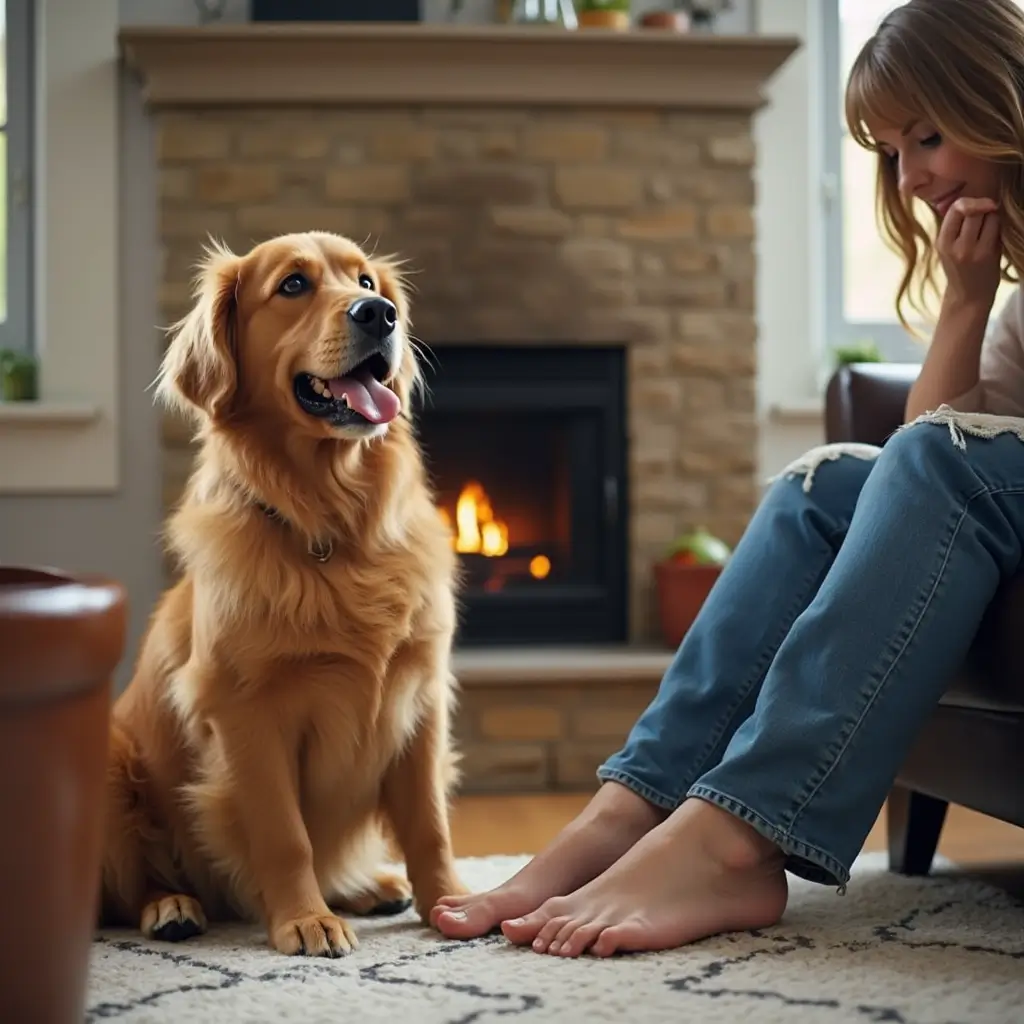
Is It Safe for Dogs to Lick Feet?
While occasional licking of feet is generally harmless, there are a few important factors to consider before letting your dog indulge in this habit. From hygiene concerns to potential behavioral implications, understanding the risks can help ensure your dog’s well-being.
1. Hygiene and Health Concerns
Although dogs have strong immune systems, allowing them to lick feet—especially unwashed ones—can expose them to bacteria, dirt, and harmful substances. Here are some specific concerns:
- Bacteria and Germs: Human feet come into contact with various surfaces throughout the day, collecting bacteria, fungi, and dirt. If your dog licks your feet regularly, they may be ingesting unwanted germs that could potentially cause stomach upset or infections.
- Lotions and Skincare Products: Many people use lotions, foot creams, or medicated ointments that contain chemicals, fragrances, or essential oils. Some of these substances can be toxic to dogs if ingested. Ingredients like tea tree oil, menthol, or salicylic acid can be harmful, causing digestive issues, skin irritation, or even poisoning in severe cases.
- Sweat and Salt Intake: While dogs are attracted to the salty taste of sweat, consuming excessive amounts may not be ideal. A high intake of sodium can lead to dehydration, digestive discomfort, or electrolyte imbalances in some dogs.
- Fungal Infections (Athlete’s Foot): If you have a fungal infection like athlete’s foot, your dog licking your feet could potentially expose them to the infection. While dogs are not at high risk for human fungal infections, they can carry the fungi in their saliva and spread it to other areas of your skin or household surfaces.
What You Can Do:
- Wash your feet regularly to minimize bacteria and dirt before allowing your dog to lick them.
- Avoid letting your dog lick your feet if you’ve applied lotions, creams, or medicated treatments.
- If your dog starts experiencing stomach issues after licking feet, consult a veterinarian.
2. Behavioral Implications
While licking is a natural behavior for dogs, excessive or compulsive licking can be a sign of an underlying behavioral issue. Here are some reasons why licking may go beyond a simple habit:
- Anxiety and Stress: Dogs often use licking as a self-soothing mechanism. If your dog constantly licks your feet—especially when they are feeling anxious, stressed, or left alone—it may be a coping mechanism for separation anxiety or nervousness.
- Obsessive-Compulsive Behavior (OCD): Some dogs develop obsessive licking habits as a result of boredom, lack of stimulation, or compulsive tendencies. If your dog is fixated on licking feet to the point where they ignore other activities, it might be time to intervene.
- Attention-Seeking Behavior: If your dog has learned that licking your feet gets a reaction—whether it’s laughter, petting, or even asking them to stop—they may continue the behavior as a way to gain attention.
- Underlying Medical Issues: Sometimes, excessive licking can indicate underlying health issues such as allergies, gastrointestinal discomfort, or skin irritation. Dogs may lick as a way to self-medicate or distract themselves from physical discomfort.
What You Can Do:
- Observe when and how often your dog licks your feet. If it happens frequently during stressful situations, it may be anxiety-related.
- Provide alternative activities like chew toys, licking mats, or puzzle toys to redirect their attention.
- Use positive reinforcement training to encourage non-licking behaviors.
- If licking becomes obsessive, consult a veterinarian or animal behaviorist to determine if there’s an underlying medical or psychological cause.
How to Manage or Stop Excessive Foot Licking
If your dog’s licking habit has become excessive or bothersome, it’s important to take steps to redirect this behavior. While licking is a natural part of canine behavior, excessive licking can be a sign of boredom, anxiety, or an unmet need. Fortunately, there are several effective strategies to manage or stop excessive foot licking.
1. Providing Alternatives
One of the most effective ways to manage your dog’s excessive foot licking is by offering alternatives that redirect their attention. By providing more engaging activities, you can help satisfy your dog’s natural instincts while discouraging the licking behavior.
- Chew Toys: Chew toys are a great way to keep your dog occupied and redirect their focus. Dogs naturally need to chew, and having a variety of chew toys can prevent them from focusing on your feet. Interactive or durable toys can keep your dog entertained for hours and provide healthy stimulation.
- Licking Mats or Puzzles: Licking mats or puzzle toys can also serve as alternatives to foot licking. These tools stimulate your dog’s mind and provide a satisfying experience that mimics the licking behavior in a more controlled and healthy way. Spread peanut butter (safe for dogs) or yogurt on a licking mat to provide a long-lasting distraction.
- Exercise and Playtime: A dog that is bored or under-exercised may resort to licking as a way to release pent-up energy. Ensuring your dog gets plenty of physical exercise—whether through walks, playtime, or activities like fetch can reduce their need to engage in repetitive behaviors like licking.
By redirecting your dog’s attention to these alternatives, you can break the cycle of excessive licking and provide a more appropriate outlet for their natural instincts.
2. Training and Positive Reinforcement
Training your dog to stop licking your feet is one of the most effective ways to address the behavior. Positive reinforcement methods can help teach your dog that there are better ways to interact with you than licking your feet.
- Use Commands like “Leave It”: Teaching your dog commands such as “leave it” or “no lick” can be helpful in stopping the foot-licking behavior. When your dog starts to lick your feet, calmly say the command and redirect their focus to a more appropriate behavior, such as sitting or playing with a toy.
- Reward Non-Licking Behavior: Whenever your dog refrains from licking your feet, make sure to reward them with praise, treats, or a favorite toy. Positive reinforcement helps your dog understand that not licking leads to rewarding outcomes.
- Consistency is Key: Consistency is important when training your dog. Ensure that all family members use the same commands and reinforce positive behavior. If you catch your dog licking your feet, immediately redirect them and provide a reward for ceasing the behavior. Over time, they will learn that licking isn’t the preferred way to engage with you.
- Redirect to Other Behaviors: In addition to teaching commands, you can also redirect your dog’s attention to other behaviors that are more acceptable. For example, if your dog starts licking, encourage them to fetch a toy or practice a trick they know.
Using training and positive reinforcement not only helps eliminate unwanted behavior but also strengthens the bond between you and your dog.
3. Checking for Underlying Issues
If excessive foot licking persists despite your efforts to redirect the behavior, it’s important to consider whether there might be an underlying medical or behavioral issue that needs to be addressed.
- Veterinary Advice: Licking that seems compulsive or excessive could be a sign of anxiety, stress, or even an underlying health problem. It’s essential to consult a veterinarian if you notice that your dog’s licking behavior is persistent or worsening.
- Skin Issues: Your dog could be experiencing itching, allergies, or a skin infection that causes them to lick excessively.
- Gastrointestinal Problems: Some dogs lick excessively as a way to self-soothe or distract themselves from gastrointestinal discomfort.
- Anxiety or OCD: Licking may also be a sign of anxiety or obsessive-compulsive disorder (OCD), which can lead to repetitive behaviors like foot licking.
- Canine Behavior Consultation: If your dog’s behavior seems to be driven by emotional or psychological issues, a certified dog trainer or animal behaviorist may be able to help. They can assess your dog’s behavior and provide a tailored training plan to address the root cause of the licking.
If you suspect an underlying medical issue or behavioral concern, seeking professional advice is crucial to ensuring your dog’s overall health and well-being.
Conclusion On Why Does My Dog Lick My Feet?
In conclusion, while it may seem strange, dogs licking feet is a common behavior that can have various explanations. Whether it’s a sign of affection and bonding, a way to explore tastes and scents, or a method for seeking attention, foot licking is a natural instinct for dogs. However, excessive licking can sometimes indicate deeper issues such as anxiety, boredom, or even medical conditions.
It’s generally normal for dogs to lick feet occasionally, but if the behavior becomes excessive, compulsive, or starts to cause health concerns, it may be time to intervene. Providing alternatives, using training techniques, and consulting with a veterinarian can help manage or stop the behavior in a healthy way.
If you’ve ever wondered why your dog licks your feet, or if you’re struggling with excessive licking, we encourage you to share your experiences in the comments below. Don’t hesitate to reach out to a professional if you’re concerned about your dog’s health or behavior. Your dog’s well-being is worth the attention, and with the right steps, you can ensure they stay happy and healthy!
Frequently Asked Questions
1. Why does my dog lick my feet?
Dogs lick feet for various reasons, including showing affection, exploring scents and tastes, seeking attention, or as a form of grooming. It’s a natural behavior for dogs, and in many cases, it’s harmless.
2. Is it normal for dogs to lick their owner’s feet?
Yes, it is normal for dogs to lick their owner’s feet. It can be a sign of affection or curiosity. However, if the licking becomes excessive, it may indicate anxiety or other underlying issues.
3. Can licking feet be harmful to my dog?
While occasional licking is usually harmless, if your feet are dirty, contain harmful substances like lotions, or have a fungal infection, it could pose a risk to your dog. Additionally, if your dog’s licking becomes compulsive, it might cause skin irritation or discomfort.
4. How can I stop my dog from licking my feet?
To stop excessive foot licking, provide alternatives like chew toys or licking mats, train your dog with commands like “leave it,” and offer positive reinforcement for non-licking behavior. If the behavior persists, consult a veterinarian for advice.
5. What should I do if my dog’s foot licking is excessive?
If the licking becomes excessive or compulsive, it could be a sign of anxiety, stress, or an underlying medical issue. Consult with a veterinarian or an animal behaviorist to rule out health concerns and develop a proper training plan.
6. Can foot licking indicate anxiety or stress?
Yes, excessive licking, including foot licking, can be a sign of anxiety or stress in dogs. If your dog is licking their feet in response to being left alone or when they’re feeling anxious, it may be a coping mechanism. In such cases, addressing the root cause of the anxiety is essential.
7. Is there a health risk if my dog licks my feet?
Occasional licking is generally safe, but there are risks if your feet are dirty, sweaty, or have harmful substances like lotions or creams. Bacteria, fungi, or chemicals can be harmful to your dog if ingested. Make sure to keep your feet clean and avoid letting your dog lick if you have applied any harmful substances.
8. When should I seek veterinary help for my dog’s licking?
If your dog’s foot licking is persistent, causing skin irritation, or associated with other concerning symptoms such as changes in appetite, behavior, or energy levels, it’s best to consult a veterinarian. Excessive licking may be a sign of a medical or behavioral issue that requires attention.

